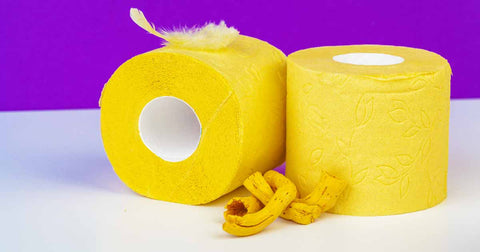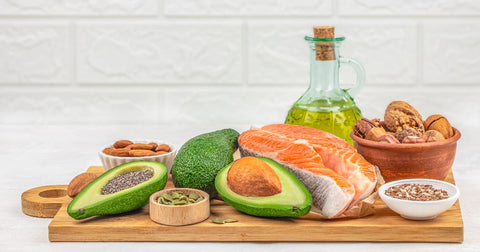Changes in stool color can be alarming, and yellow poop is no exception. While occasional variations in stool color are normal, persistent yellow poop or diarrhea can signal an underlying issue.

If you're experiencing this, you're not alone. Many seek answers to questions like, "What does yellow diarrhea mean?" or "Why is my diarrhea yellow?". This article will explore the potential causes of yellow poop and provide practical steps on how to fix it naturally.
Understanding Yellow Diarrhea
The color of your stool is primarily influenced by bile, a digestive fluid produced by your liver. Bile starts as a yellow-green color and gradually changes to brown as it travels through your digestive system.
Yellow poop or diarrhea often indicates that food is passing through your intestines too quickly, preventing bile from fully transforming into its typical brown color.
Why is My Diarrhea Yellow? Potential Causes
Several factors can contribute to yellow diarrhea:

-
Dietary Changes: Sudden changes in your diet, especially increased fat intake, can lead to yellow, greasy stools.
-
Infections: Gastrointestinal infections, such as those caused by viruses or bacteria, can cause diarrhea and changes in stool color.
-
Malabsorption: Conditions like celiac disease or pancreatic insufficiency can hinder nutrient absorption, leading to yellow, fatty stools.
-
Gallbladder Issues: Problems with your gallbladder, such as gallstones, can disrupt bile flow and affect stool color.
- Medications: Certain medications, like antibiotics or laxatives, can also cause yellow diarrhea.
How to Fix Yellow Poop: Practical Strategies
If you're experiencing yellow poop or diarrhea, here are some steps you can take to address it naturally:
-
Stay Hydrated: Diarrhea can lead to dehydration, so drink plenty of fluids like water, clear broths, or electrolyte drinks.
-
Dietary Adjustments:
-
Reduce your intake of fatty foods.
-
Avoid processed foods and sugary drinks.
-
Focus on bland, easy-to-digest foods like bananas, rice, applesauce, and toast (BRAT diet).
-
Probiotics: Consider adding probiotic-rich foods like yogurt or kefir to your diet to help restore the balance of gut bacteria.
Bright Yellow Diarrhea: When to Seek Help

If you experience bright yellow diarrhea, especially if it's persistent, severe, or accompanied by other symptoms like fever, abdominal pain, or blood in your stool, it's crucial to seek medical attention.
Food Intolerance and Digestive Health
Recurring digestive issues, including changes in stool color, can sometimes be linked to food intolerances or sensitivities. These intolerances can trigger inflammation and disrupt your gut health.
A food sensitivity test kit can help you identify specific foods that might be causing your symptoms. By eliminating or reducing these trigger foods, you can support a healthy gut and potentially alleviate digestive problems.
Key Takeaways
-
Yellow poop or diarrhea can be caused by various factors, including dietary changes, infections, malabsorption, or gallbladder issues.
-
Staying hydrated, making dietary adjustments, and considering probiotics can help manage yellow diarrhea.
-
If you experience bright yellow diarrhea or other concerning symptoms, consult a doctor.

-
Food intolerances can contribute to digestive issues, and a food sensitivity test can help identify triggers.
Remember, this article is intended for informational purposes only and should not be considered a substitute for professional medical advice. If you have any concerns about your digestive health, consult a qualified healthcare professional.
Frequently Asked Questions:
1. Is yellow poop always a sign of something serious?
Not necessarily. Occasional yellow stool can be normal, especially if it's related to dietary changes. However, if it's persistent, accompanied by other symptoms like abdominal pain or fever, or if the stool is pale or greasy, it's best to consult a doctor.
2. What are some common foods that can cause yellow poop?
Foods high in fat, such as fried foods, fatty meats, and dairy products, can sometimes lead to yellow stool. Artificial food coloring can also temporarily change the color of your stool.
3. Can stress or anxiety affect the color of my poop?
While stress doesn't directly turn your poop yellow, it can affect your digestive system and lead to changes in bowel habits, potentially influencing stool color.
4. I'm experiencing yellow diarrhea and abdominal cramps. Could this be a stomach bug?
Yes, yellow diarrhea with cramps can be a symptom of gastroenteritis, commonly known as the stomach flu. It's often caused by a viral or bacterial infection and usually resolves on its own within a few days. However, if your symptoms are severe or persistent, seek medical attention.
5. How can a food sensitivity test help with yellow poop?
If your yellow stool is related to a food intolerance or sensitivity, a food sensitivity test can help identify the specific foods triggering your symptoms. By eliminating or reducing these trigger foods, you can potentially improve your gut health and normalize your stool color.


.png?v=1737390083)
.png?v=1737187409)


